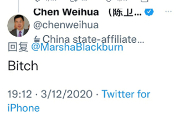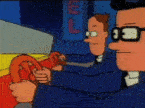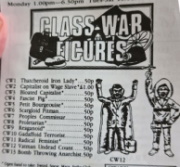|
Pepe Silvia Browne posted:them thinking the problem with their branding is that people associate it too closely with quality is very funny I think it's more that they don't want that brand hurt given all the dogshit they're pumping out. Someone said that more eloquently itt, don't remember who though. Either that or the business execs are so up their own asses.
|
|
|
|

|
| # ? May 26, 2024 19:05 |
|
AnimeIsTrash posted:im watching family guy right now 
|
|
|

|
|
|
|
|
oh is it just the expanded streaming service theyre calling max? for some reason i thought they were ditching the HBO brand entirely which seemed like a "ceo gets immediately ousted" kind of fuckup
|
|
|
|
ya thats the ptoint fo the show, seth macfarlane virtue signaling
|
|
|
|
Fellatio del Toro posted:oh is it just the expanded streaming service theyre calling max? for some reason i thought they were ditching the HBO brand entirely which seemed like a "ceo gets immediately ousted" kind of fuckup Yeah the problem they're probably actually having is that people think HBOMax is just HBO stuff and not just a Warner Bros streaming service
|
|
|
|
Fellatio del Toro posted:oh is it just the expanded streaming service theyre calling max? for some reason i thought they were ditching the HBO brand entirely which seemed like a "ceo gets immediately ousted" kind of fuckup It's a new app/service called 'max' that has an HBO channel within it. Think of it like going into disney+ and you can click on the star wars/marvel tabs It's pretty confusing since the HBOmax app still works. I think discovery+ is shut down now but who knows
|
|
|
|
Best Buy's house brand Insignia is merging with Apple, to create a new brand called "ValuePhone" which will focus exclusively on chargers and screen protectors. Apple users will be able to get a 5% off coupon for wired earbuds. iPhone support will wind down by the end of q4 2023.
|
|
|
|
loquacius posted:same tbh The Boys has done a remarkable job with the awful source material they started with, and it's fine, but it's really not as smart as it thinks it is. It periodically feels like it's going to make some broader or more interesting statement but then just falls back onto "what if superheroes were assholes?" in a way that shows it's really not that far from the source material.
|
|
|
|
nonathlon posted:The Boys has done a remarkable job with the awful source material they started with, and it's fine, but it's really not as smart as it thinks it is. It periodically feels like it's going to make some broader or more interesting statement but then just falls back onto "what if superheroes were assholes?" in a way that shows it's really not that far from the source material. They just removed all the
|
|
|
|
good for the goat todd haynes but i hope i can catch this in a theater hopefully this at least gets it a lot of exposure https://twitter.com/Variety/status/1660931283877281793 also lol @ this https://twitter.com/DEADLINE/status/1660220918117875712
|
|
|
|
AnimeIsTrash posted:They just removed all the 
|
|
|
|
How did the internet become so puritanical? On social media, outspoken anti-sex advocates increasingly cry “gross” at everything from R-rated rom-coms to fictional characters and queer people having sex to consenting adults with slight age gaps to dating short people. They see oversexualization in just about everything. They often accuse the things they dislike of being coded fronts for pedophilia, and the people who enjoy those things of being sexual predators. These social media users frequently form enclaves that turn as nightmarish and troubling as the things they’re ostensibly trying to police. This dovetails with what we’re being told right now about Gen Z and sex: They’re having less casual sex, they hate dating, they’re more reserved about relationships in general. It’s easy to pigeonhole online anti-sex police as being teens and young adults, a.k.a. “puriteens.” Because so much of this comes down to carnal horror, you might assume that everyone who’s horrified is a teen who just hasn’t arrived at a mature view of sex and other adult activity. Such anti-sex zeal increasingly forces sex-positive communities back into the internet’s underground. It also aids and abets the larger cultural shift toward regressive attitudes and censorship of sexual minorities and sex-positive content. Yet overwhelmingly, the common thread among this new generation of “antis” — a broad label for people who are opposed to sexual content in media — isn’t that they are minors who are scared of sex. It’s that none of them distinguish between fictional harm and real-world harm. That is, regardless of their ages, they believe fiction not only can have a real-world impact, but that it always has a real-world impact. To understand how we got here, we have to look at the wellspring from which much of the internet’s creative impulses flow: online fandom, where superusers gather to celebrate, write fanfiction, and create fan art about the media and characters they love. On Tumblr and Twitter, where so much fandom discourse happens, this conversation about sexual content in media has spawned an entire movement called “anti-fandom.” In the wake of the 2018 passage of the internet child protection bill FOSTA-SESTA in the US, fandom’s proudly sex-positive culture has increasingly become sanitized, homogenized, and erased — which has allowed the puritanical voices of these “anti-fans” to take their place. This trend would be bad news in any online community, but it’s been especially heady and unwieldy in fandom, an entire culture built around feeling things strongly, not rationally. The result is one of the unlikeliest fronts of the culture war: an internet community, once the bastion of delightful deviance and subversion, being completely overtaken by a new form of purity culture often spearheaded by people who would otherwise describe themselves as politically liberal. Though this may sound like a niche fandom issue, this modern puritanism has spread far into the wider culture, intersecting with both a broader media illiteracy and a moral panic that crosses the political spectrum. It’s making it more and more impossible to have a healthy discourse about sex at all. Above all else, fans are passionate. Fandom is where the internet houses some of its most engaged communities — where fans flock to celebrate their favorite stories, create fan works, carry on intense discussions, and argue over which fictional or celebrity relationships they’re shipping. During the first half of the 2010s, that passion meant that fans were effectively cultural superspreaders, proselytizing their favorites, from Marvel to K-pop to Netflix, far and wide. Their cultural influence, especially through the Tumblr-to-BuzzFeed pipeline, was outsize. You may not have been on Tumblr then, but its fandom-infused language and culture likely heavily influenced your internet experience just the same. Part of what Tumblr effortlessly exported, along with its fannish sensibility, was its users’ awareness of social justice concepts and language. The Tumblr culture of the early 2010s rapidly shifted an entire generation of social media users toward the left. That shift started not on Tumblr, but on LiveJournal, thanks to a widespread, year-long conversation about racism in geek culture in 2009 that became known as RaceFail. In 2010, LiveJournal became frequently nonfunctional due to intermittent hacker attacks, which sent thousands of displaced fans to Tumblr. With them, they brought all of their recent conversations about race and social justice. The result was an unexpected culture clash between the fandom teens of still-new Tumblr and the fandom adults of LiveJournal. Many Tumblr users, regardless of age and academic experience, got crash courses in progressive ideology and everything from socialism to structuralism — but that education wasn’t always easy or welcome. “I was on Tumblr as the migration was happening,” journalist Allegra Rosenberg told me. “I distinctly remember the shift in tenor of doing fandom on Tumblr in late 2010, early 2011 as the LiveJournal adults came over, bringing with them the language of feminism, the language of social justice, intersectionality.” “I remember feeling almost scared or offended,” Rosenberg said, “because I was like, you guys are trying to make this serious. We’re just making memes. I was just a kid and I felt kind of threatened by what I perceived to be this atmosphere of seriousness, because I don’t think I really understood what had been going on over there.” The language of social justice may have been revelatory to many fans, but it also became fodder for zealotry and demagoguery. It frequently became a double-edged sword, weaponized by and against the people using it. Members of the alt-right started using the phrase “social justice warrior” to mockingly describe zealous Tumblr users who performed what they saw as shallow, overly aggressive, or inauthentic versions of progressive politics. Tumblr teens also learned to weaponize this language, often through performativity that became a core part of 2010s fandom culture. This coincided with the rise of “call-out culture.” Blogs such as Your Fave Is Problematic typified what some dubbed Tumblr’s “accountability culture” by simply listing things various beloved celebrities, usually popular within geek culture, had done that were bad or troubling. Call-out culture predated and existed independently from cancel culture. Its goal was always to raise awareness, not prompt mass harassment or boycotts, but one easily begets the other. Fans of the era adopted an eagerness to label absolutely everything even slightly complicated as “problematic,” and that easily translated into harassment of others who still enjoyed those now-tainted stories and creators. Once fans had been given the tools of social media harassment and the moral motivation of social justice, they waged war on each other — often for things that only nominally had to do with social justice and were instead about things like fandom shipping and character biases. These fights often obscured or further marginalized actual fans of color and queer fans, all in the name of fighting on their behalf. Soon, this tendency converged with “antis” in fandom: people who were identified primarily not through their love of a thing but for their hatred of it. Over the back half of the 2010s, the notion of what an “anti” was began to shift away from, say, K-pop stans hating on a specific K-pop star, toward broad opposition to various fandom ideologies and practices. This usually comes down to two things: sexualized content and shipping. Especially shipping. Few things in fandom are more polarizing than who a character falls in love with or ends up with or who you want them to end up with instead. More has been won and lost in the name of ship wars — fans fighting over which ship is the best — than time could detail. Specifically, in the Voltron fandom in 2016, hatred for a single ship on the animated TV show reportedly led to the creation of an entirely new concept in fandom: the idea of being “anti-ship” and “pro-ship.” The stated goal of this fight was to call out and oppose alleged pedophiles in fandom. But the actual goal was to wage war against one specific pairing by demonizing as a pedophile anyone who shipped it. (The characters in question, Shiro and Keith, were approximately 25 and 18, respectively, in the show’s first season.) Fans devoted to this “problematic” ship gradually got shorthanded as “pro-ship,” which then became a generalized label for all shippers. In other words, if you shipped characters in fandom — which is arguably the dominant reason most people are in fandom — then you were suddenly on notice as being harmful. To be blunt, this is bonkers. The act of wanting two characters to fall madly in love, and celebrating when they do, is a natural response to fiction. If you were, say, a person who read or watched The Hunger Games and rooted for Peeta and Katniss, this group might brand you as problematic for shipping two teenagers. Yet shipping is also often explicitly sexual, which makes it prone to distortion by people who want a moral excuse to oppose shipping. Just as with the original Voltron fandom ship war that presaged much of this discourse, people who are “anti-ship” often start out by seeking to attack specific ships based on their personal bias. Rather than acknowledging that bias, however, they instead frame fictional depictions of sex as harmful. This allows them to paint not only the ship they hate, but all ships, and shipping itself, as harmful. It may sound hard to comprehend that anyone could take this rhetoric seriously, but the deeply emotional and accusatory nature of calling someone a pedophile makes it wildly effective. (Multiple sources I talked to for this article told me of unexpectedly vicious personal encounters with purity culture; everything from online accusations to a real-life friend group considering ostracization over suspicions the source was “pro-ship.”) Sam Aburime, an artist and independent fan scholar who has dedicated years to tracking anti-fandom examples, argues that the movement is part of the changing generational nature of fandom. Older Gen Z and younger millennials who learned the language of social justice on Tumblr are now teaching younger generations how to wield those concepts for ill. “I think they grew up with faux activism as it was starting online,” Aburime told me, “where it was like, ‘if you like this, or if you don’t do this, you’re a bad person,’ when it’s just cartoons at the end of the day.” It’s not a coincidence that anti-fandom discourse, which has single-handedly reframed decades of sex positivity in fandom, has also coincided with a broader crackdown on sex positivity across the internet. Originally, Tumblr culture’s nuanced language around politics and accountability coexisted alongside a rampant, thriving, sexually explicit counterculture. Fans and non-fans, many of whom were queer, sex educators, and/or sex workers, enjoyed a healthy relationship to sexual expression during this era. While Tumblr became notorious for hosting porn, the reality was that the permissiveness of Tumblr’s adult content policies made it a safe space for many marginalized communities. That all changed with the passage of the child protection bill FOSTA-SESTA in 2018. FOSTA heralded a sweeping crackdown on online adult content; as part of the fallout, huge swaths of the sex-positive internet were wiped out in the name of protecting children. Among those decimated communities were sex workers and sex educators on Tumblr, as well as the legions of users, many of whom were queer and genderqueer, who sought self-expression and explored their identities through sexualized content. Overnight, via its infamous ban on porn, Tumblr went from being a notably horny platform to a site full of regressive, paranoid, wary fans who were obsessed with spotting pedophilia and illicit sexual materials everywhere and anywhere — even if the things they deemed immoral and illicit were nowhere close to illegal. FOSTA seems to have weakened the natural resistance of fandom and internet culture at large to the US’s broader puritanical, anti-sex culture. The purity movement formally began in the ’90s within evangelical culture as a way of normalizing an abstinence-only approach to sex, especially among teens. In the modern era, the language of this movement has converged with that of trans-exclusionary radical feminists (TERFs), who enact a regressive approach to sex and gender expression. “If you go into certain radfem forums, you’ll see language mirrored one-to-one,” Aburime told me, describing the way TERF rhetoric overlaps with and sometimes infiltrates fandom spaces. “It’s almost like a game — slipping some ideology secretly” into a fannish experience. “It’s misinformation under the guise of activism.” Like the US’s larger current moral panic over drag shows, LGBTQ people, and “groomers,” fandom’s culture has regressed toward sexual repression, attacks on sexual minorities, and censorship of art made by marginalized people. The shifts happening in fandom and across the internet help exacerbate this larger cultural shift. “There’s no meaningful difference to me between a right winger who calls me a pedo because I’m trans and an antishipper that calls me a pedo because I read Homestuck,” said Farrah, a 33-year-old fan from North Carolina whose full name has been withheld at their request, referring to the famously weird webcomic. “They’re both putting me and people like me in a dangerous position.” “It’s hard to say where fandom starts and where everything else begins,” Rosenberg told me. She identifies the root of the shift as a core of “emotion and disgust” in response to various types of sexualized content, but while this response to sexual deviance has always existed, the internet allows fans to express their disgust in new ways, and the rise of anti-fandom allows fans to pathologize all kinds of things — from garden-variety kink to age gaps and sexualized cartoons. Another major factor in the intensification of all this is Twitter, specifically the mass migration of many fandom cultures to Twitter over the last decade. “When these cultures moved to Twitter and were exposed to literally everybody and everything,” Rosenberg said, “the stakes were higher, in being on the so-called winning team.” Twitter also allowed fans to codify and systematize harassment through the use of platform-specific tools like hashtags and mass-brigading by bots, as we saw with the Depp-Heard trial last year. As Musk-era Twitter’s abuse team has dwindled, multiple sources told me they have been using the platform less, retreating into siloed spaces like private Discord servers and locked mailing lists or Facebook groups. Yet those siloed spaces do little to solve the problems; instead, they typically reinforce and entrench all the niche ideas that led to fandom extremism to begin with. One positive development is that Tumblr recently brought back, in a limited capacity, the ability to create NSFW content on the site. While this won’t restore the zany porn-for-all days of yesteryear, it might encourage the return of sex-positive communities to drown out the noisy, harassing fringe of haters. Farrah, who left Twitter due to the harassment there, told me they’re still on Tumblr, and hopeful things are changing. “I think more people are starting to realize the extremity in the culture and politics around them,” they said, “and that awareness makes them better equipped to recognize the same extremism in fandom. I’ve seen more robust calls for a return to, ‘don’t like don’t read,’ and, ‘your kink is not my kink and that’s okay,’ in the last year or two than I had in a very long time.” The downside is that the wider crackdown on sexual expression, especially in the United States, is only getting worse. That bodes ill for the internet and all its citizens, especially since media literacy as a whole is also on the decline. As purity culture spreads, the idea of depicting fictional harm as equivalent to real-world harm grows and spreads along with it. Then again, if anyone can creatively respond to a culture of increasingly absurd attacks on ingenuity and imagination, it’s an army of passionate deviants who’ve historically been vanguards of the weird, the queer, and the subversive. They’re sexual rebels and literary freedom fighters. If fans can’t kick that nonsense to the curb, who can?
|
|
|
|
is this still white supremacist or did it become good again like azov
|
|
|
|
Some Guy TT posted:is this still white supremacist or did it become good again like azov lol imagining mcdonalds doing a commercial where the mac tonight guy has to formally distance himself from the white supremacy memes
|
|
|
|
Good Soldier Svejk posted:the moments of empathy are deliberately fleeting I figured the reason I heard so many good things about the show was simply Americans watching it while thinking to themselves, drat being rich would own.
|
|
|
|
Not only is Stephen Colbert off the air due to the WGA writers strike, he just had two of his other TV shows canceled. Colbert was executive producing the animated series Tooning Out The News and the talk show Hell of a Week with Charlamagn Tha God, but according to a report by Deadline, both just ended abruptly. The Paramount Global Network opted to cancel the shows, both of which aired on Comedy Central. "We will not be resuming production on another season of Hell of A Week," a spokesperson for Comedy Central said. "We thank Charlamagne and the amazing team behind the show for its impactful conversations and the incredible collaboration as we look ahead to our future partnership with Charlamagne." As for Tooning Out the News, they added: "The Emmy award-nominated Stephen Colbert Presents Tooning Out The News pushed the boundaries of satirical news and disrupted the late-night landscape with its outspoken animated anchors. We are deeply grateful to Stephen Colbert, RJ Fried, the production team and the talented actors and animators for their unwavering partnership and dedication." Tooning Out The News premiered in April of 2020 exclusively on the streaming service CBS All Access, which was later rebranded as Paramount+. It featured a cast of animated newscasters and other characters in vignettes and sketches that mocked the news of the day and the broadcast news industry itself. It centered around anchor James Smartwood (Fried), and also starred Maureen Monahan, Jack Bensinger, Naima Pearce, Ike Ufomadu, Zach Smilovitz and Addison Anderson. It shared much of the creative team from Our Cartoon President – another Colbert-produced animated series that aired on Showtime during the president of Donald Trump. Meanwhile, Hell of a Week premiered in September of 2021 – originally with the title Tha God's Honest Truth. It was a half-hour talk show which gradually leaned into more a panel style with a host of ecclectic guests engaged in discussions more than interviews. It often explored politics and social issues with guests who had a broad range of backgrounds and political associations. The episode where Charlamagne spoke with Vice President Kamala Harris made national headlines when Charlamagne pressed her on the inordinate power of Sen. Joe Manchin. She told the host: "Stop talking like a Republican." It sounds like Comedy Central is more than open to further collaborations with Charlamagne Tha God, who continues to host The Breakfast Club on nationally syndicated radio. As for Colbert, he has put his full support behind the WGA and the striking writers, and has not commented publicly on his TV work since the strike began.
|
|
|
|
Some Guy TT posted:Tooning Out The News premiered in April of 2020 exclusively on the streaming service CBS All Access, which was later rebranded as Paramount+. It featured a cast of animated newscasters and other characters in vignettes and sketches that mocked the news of the day and the broadcast news industry itself. It centered around anchor James Smartwood (Fried), and also starred Maureen Monahan, Jack Bensinger, Naima Pearce, Ike Ufomadu, Zach Smilovitz and Addison Anderson. It shared much of the creative team from Our Cartoon President – another Colbert-produced animated series that aired on Showtime during the president of Donald Trump.
|
|
|
|
AnimeIsTrash posted:They just removed all the while true, the boys still owns
|
|
|
|
oh i saw the pipeline movie, it felt kind of extremely naive but the parts where they're building bombs are cool, three stars
|
|
|
|
Interesting
|
|
|
|
if you scroll up and down past those real fast it's like the keys are actually jingling
|
|
|
|
I’m still sad that Titus Pullo is gone
|
|
|
|
Pepe Silvia Browne posted:Yeah the problem they're probably actually having is that people think HBOMax is just HBO stuff and not just a Warner Bros streaming service there is nothing confusing about this at all, it was a well considered decision and everyone saying differently is just a hater https://twitter.com/erikmbaker/status/1660845222304120834?s=20
|
|
|
|
Uncle Boogeyman posted:if you scroll up and down past those real fast it's like the keys are actually jingling at first i thought it was a pin, like "put a pin in it", but now that i know this trick it's far more engaging LGD posted:there is nothing confusing about this at all, it was a well considered decision and everyone saying differently is just a hater fascinating to watch them realize how stupid this decision was even as they follow through with the decision
|
|
|
|
Btw for anyone curious about Succession this is basically a thing they would do on Succession Like, Tom would think up that slogan
|
|
|
|
wasn't there also a time where there were 2-3 different hbo streaming services?
|
|
|
|
loquacius posted:Btw for anyone curious about Succession this is basically a thing they would do on Succession wow can't wait to watch that show
|
|
|
|
AnimeIsTrash posted:wasn't there also a time where there were 2-3 different hbo streaming services? i think hbonow and hbogo were active at the same time? loquacius posted:Btw for anyone curious about Succession this is basically a thing they would do on Succession 
|
|
|
|
Wraith of J.O.I. posted:i think hbonow and hbogo were active at the same time? Yeah HBOnow I think was the one they gave you if you were being given access to the HBO streaming platform through some other provider like AT&T or Time Warner, and HBOgo was their standalone streaming service. I think this had something to do with satisfying the exclusivity agreements they had with telecom companies regarding people having to buy some level of basic packages before they could buy access to HBO as a premium package.
|
|
|
|
Or maybe I'm switching those two around, but the point is they had multiple streaming services offering the same content in parallel with names that were almost the same.
|
|
|
|
Is the joke here that this was AI-generated?
|
|
|
|
quote:“There’s no meaningful difference to me between a right winger who calls me a pedo because I’m trans and an antishipper that calls me a pedo because I read Homestuck,” said Farrah, a 33-year-old fan from North Carolina whose full name has been withheld at their request, referring to the famously weird webcomic. “They’re both putting me and people like me in a dangerous position.” This is where I read before my brain exploded from reading too many words
|
|
|
|
The MAX app for Xbox has the ability to customize the appearance of your subtitles, which is a good change
|
|
|
|
I am glad that the faction of Internet people who did so much tumblr that they just kind of hate the idea of anyone having sex have invented a name for themselves, even if nobody would understand me if I used it
|
|
|
|
loquacius posted:I am glad that the faction of Internet people who did so much tumblr that they just kind of hate the idea of anyone having sex have invented a name for themselves, even if nobody would understand me if I used it There were a lot of words. I agree with you, and understand your words in a spiritual way, but specifically I'm lost. Outta that word salad which did you pick for that definition for the virgin-core promise-ring purity-ball folks except online?
|
|
|
|
It was pretty early on, I didn't read the whole thing eitherSome Guy TT posted:Yet overwhelmingly, the common thread among this new generation of “antis” — a broad label for people who are opposed to sexual content in media — isn’t that they are minors who are scared of sex. It’s that none of them distinguish between fictional harm and real-world harm. That is, regardless of their ages, they believe fiction not only can have a real-world impact, but that it always has a real-world impact.
|
|
|
|
I still believe that this conviction that fictional crimes are the same as IRL crimes is the result of pop culture being the only thing in a lot of people's lives that they really enjoy and from thence their pathological need for it to really mean something material
|
|
|
loquacius posted:I still believe that this conviction that fictional crimes are the same as IRL crimes is the result of pop culture being the only thing in a lot of people's lives that they really enjoy and from thence their pathological need for it to really mean something material  The shadows on the wall of the cave are doing stuff I don't like! I would ever go as far to say this is the only thing in many people's lives at all. They have parasocial relationships with the characters and shows represent the bulk of the people they "interact" with. I should know, I was an isolated goonlord when I was a kid. The line between fiction and reality just gets blurred overtime and then they want every show to reflect their personal morals.
|
|
|
|
|

|
| # ? May 26, 2024 19:05 |
|
AnimeIsTrash posted:
He gets angrier the faster you swipe
|
|
|



































